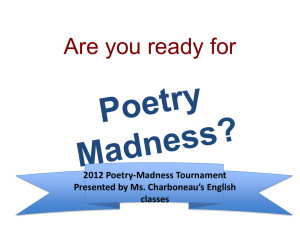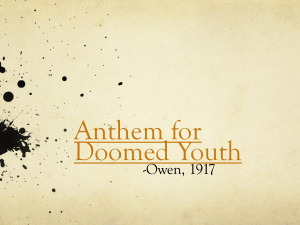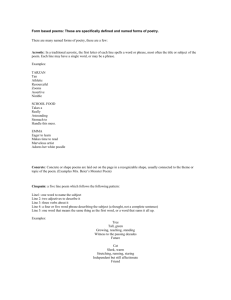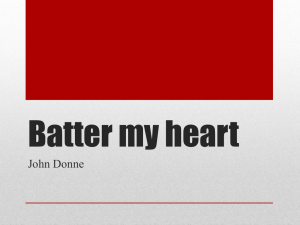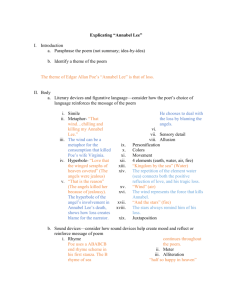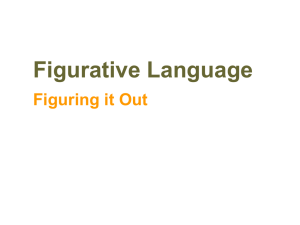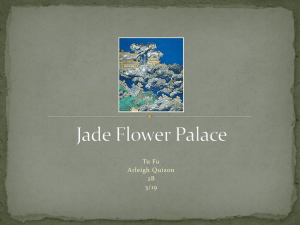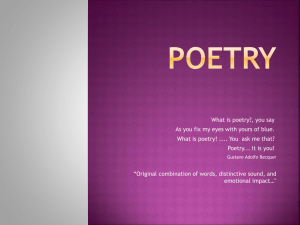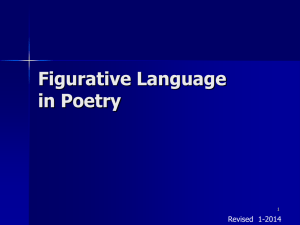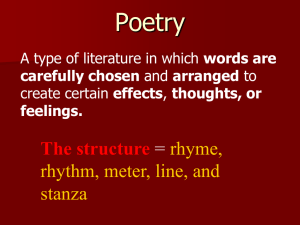Poetic Devices PPT. - Language Arts with Miss Weber
advertisement
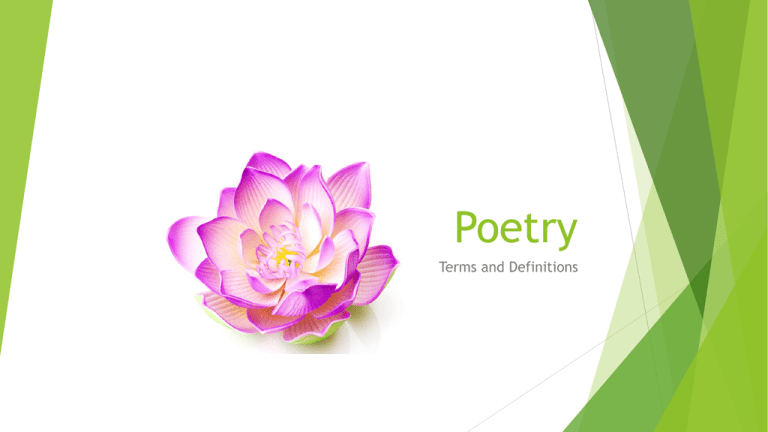
Poetry Terms and Definitions Poetic Devices Are tools that a poet can use to create rhythm, enhance a poem's meaning, or intensify a mood or feeling. Speaker A Character who says the poem. The speaker is usually not named. Mood Feeling created in the reader by a poem Created by writer’s choice of words, events, or physical setting. Examples Name different types of poetic devices Metaphor, simile, imagery, rhythm, personification, onomatopoeia, allusion, hyperbole, etc. What would the mood be of: A haunted house Disneyland A mystery novel/television show Tone The attitude of the speaker towards the subject. May be formal or informal, friendly or distant, personal or impersonal. Example What is a person’s tone when… They go on a job interview They hang out with their friends Speak to a family member about a serious issue Theme Underlying meaning of a poem. The idea a poem presents about people and life. Stanza Groups of lines in a poem, usually separated by spaces. Each stanza states a single main idea. Stanza Lengths Couplet – 2 Lines Tercet – 3 Lines Quatrain – 4 Lines Figurative Language Expressions to get across certain ideas or concepts more vividly. Simile Metaphor Personification Hyperbole Simile A comparison of 2 objects using “like” or “as”. Example: Life is like a box of chocolates Create your own TWO examples of a simile. Metaphor A comparison of 2 objects without using “like” or “as.” A metaphor typically states that object 1 IS object 2. Example: “My love is a blossoming flower” Create two metaphor of your own. Personification Comparison that gives human qualities to inanimate objects. Example: The flowers danced in the wind. Create two pieces of personification of your own. Hyperbole An extreme exaggeration Evokes some sense of ridiculousness Example: I’m so hungry I could eat a horse. Create a hyperbole of your own. Imagery Creating a picture in the reader’s mind through the senses of sight, smell, sound, taste and touch. Think of a place you have been before (somewhere familiar or popular) Describe that place using the 5 senses. DO NOT NAME THE PLACE—the class is going to guess what your imagery is describing. Symbol a person, a place, a thing, or an event that has meaning in itself and stands for something beyond itself as well Think of the sword and the stone in many King Arthur tales. Yes a sword can stand for war or political power.… But when the little boy draws the sword out of the stone, the sword comes to stand for the child’s glittering future as the power king of Camelot, as well as his close alliance with magic. The Sick Rose by William Blake O rose, thou art sick. The invisible worm That flies in the night In the howling storm Has found out thy bed Of Crimson joy, And his dark secret love Does thy life destroy. What do roses symbolize? What do worms symbolize? Rhyme 1.Repetition of sounds at the end of words. Rhyme Scheme A regular pattern of rhyming in a poem. Uses letters of alphabet to distinguish lines that rhyme. Roses are Red.-A Violets are blue.-B You look like a monkey.-C And you smell like one too.-B Mini Task: Find the Rhyme Scheme in the following poem excerpt. It’s a pretty good zoo, Said young Gerald McGrew, And the fellow who runs it Seems proud of it too. But if I ran the zoo, Said young Gerald McGrew I’d make a few changes. That’s just what I’d do Answer: aaba aaca It’s a pretty good zoo, a Said young Gerald McGrew, a And the fellow who runs it b Seems proud of it too. a But if I ran the zoo, a Said young Gerald McGrew a I’d make a few changes. c That’s just what I’d do. a Mini Task Create a poem about your one of your favorite hobbies, songs, or people. Use a rhyme scheme aaba aaca. Share with a partner. Assonance Repetition of vowel sounds in words. “Now this looks like a job for me So everybody just follow me Because we need a little controversy Because it feels so empty without me.” Consonance Repetition of consonant sounds in words. I'll swing by my ankles. She'll cling to your knees. As you hang by your nose, From a high-up trapeze. But just one thing, please, As we float through the breeze, Don't sneeze. - The Acrobats by Shel Silverstein Alliteration Repetition of the same consonant sounds at the beginning of words. “ She sells sea shells by the sea shore.” Onomatopoeia A word whose pronunciation suggests their meaning or makes the sound of the action it describes. Examples: crack, pow, boom, snap, creak, buzz, etc. Create Your Own Create a 3-stanza QUATRAIN (4 lines) poem with the rhyme scheme ABBA Keep the topic school appropriate.

